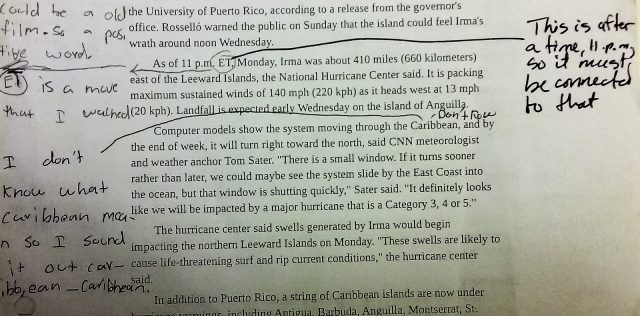One thing I’m known for throughout the school is a simple, weekly assignment that I’ve been giving for three years now: the article of the week. It’s simple, really: kids read an article from some news outlet and annotate it. I choose a few words that they must annotate, using context clues to determine the word’s meaning (as nearly as possible), and the rest of the annotations come from what Kylene Beers calls effective readers’ skills: commenting on the text, connecting to prior knowledge, questioning the text — skills like that.
I model it for them and provide a video of my own annotating process every week, and after a month or so, most students have figured it out and get straight As on the assignment. I tell them it’s like batting practice for a baseball player or shooting free throws for a basketball player — the essentials. We do it again and again and again and again and again.
It provides a great deal of insight into students’ thinking as well. Sometimes those insights are sobering.
Two things here: first, I’m more than a little worried that this student made the connection with ET in this text. He included it in his summary as well, and I asked him some questions about it.
Look again — does it make sense for an article talking about a hurricane suddenly to switch to a movie? What exactly did it say about the film?
His connection to the film makes me wonder if he was reading closely at all. After all, it talks no where about the film, obviously. The fact that it comes directly after “11 p.m.” makes me wonder if he was thinking critically at all. After all, even an eighth grader who is severely lacking in background knowledge knows what “11 p.m.” means, right?
The second concern didn’t strike me as all that unusual, and yet for that, it seems all the more frightening. “This child doesn’t know what the Caribbean is,” I almost said out loud, shortly followed with the thought, “like most on-level eighth graders.” It’s a sign of the huge gap in cultural literacy that so many kids today have compared to earlier generations. I would wager that many kids in my eighth-grade class wouldn’t be able to place the Caribbean on a map, and some might not have even known it was a sea, but they would at least know it’s a body of water.
This is not intended as a gripe about how kids today have so much less background knowledge, are so much less broadly culturally informed. The same could have been said about us, undoubtedly. At the same time, it’s an indication of how that marker keeps being moved every generation.

0 Comments